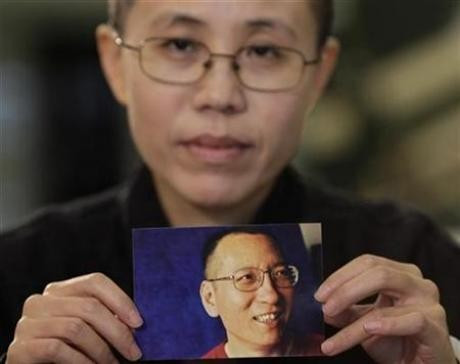A good look at Liu Xiaobo

It's not often that an article in the Guardian interests me, but yesterday between the regular complaints about the cuts and the stories of the plight of downtrodden workers in far away places, there was a real gem of a piece about the Chinese dissident and now Nobel Peace Prize winner Liu Xiaobo.
In it Barry Sautman and Yan Hairong did what most people usually don't bother to do. They actually took a good look at what Mr Xiaobo is and what he stands for, rather than taking the accepted mantra that Liu Xiaobo is a Chinese dissident and therefore worthy of praise.
In the piece they point out that not only does Mr Xiaobo oppose the Chinese government, but that he is very keen on privatisation and on the wars in Afghanistan and Iraq, and before that, Vietnam and Korea. Guardian readers are of course generally not known for their love of any of those causes (indeed if he were American Mr Xiaobo would probably find a nice home for himself in the Republican Party) and the implication seemed to be that they should think before blindly supporting Mr Xiaobo.
The other implication was of course that a man who supports highly controversial wars should perhaps not be getting a peace prize. That being said the prize was devalued somewhat as a prize for peace generating activities when it was awarded to Henry Kissinger, an award which allegedly led to satirist Tom Lehrer saying "after this there can be no satire".
However the wider point, that we should know who we are cheering on against the oppressor, is a good one.
During the protests that followed the Iranian "election" last year many were no doubt hoping that opposition leader Mir-Hossein Mousavi would get the better of the Holocaust-denier Mahmoud Ahmadinejad. While Mr Mousavi is no doubt preferable, do we really know much about him when we give him our support? Mr Mousavi was previously the Prime Minister of Iran and indeed was approved to run as a candidate by the Guardian Council (nothing to do with the Guardian newspaper) which wheedles out undesirable candidates. Clearly Mr Mousavi is not a man likely to overthrow the rule of the clerics even if he is not quite as crazed as Mr Ahmadinejad.
Then in Zimbabwe it's axiomatic that Morgan Tsvangirai is the goodie and Robert Mugabe the baddie. But who knows anything about Mr Tsvangirai other than that he is not Mr Mugabe and has suffered a number of beatings because of that very fact? How did we know, when we hoped he would depose the old tyrant, that he would not turn out to be another bully boy who changed his tune as soon as he got his hands on the levers of power?
As it happens Mr Tsvangirai seems to be a decent fellow, indeed he was described as a "good man" by the US envoy in Harare, if the Wikileaks cables are to be believed. That being said a few of his followers were reportedly not so desirable.
But again and again we find ourselves supporting people who perhaps should not be supported just because they are not someone else.
Hitler was supported or perhaps more accurately tolerated by many on the grounds that he was not a Communist, likewise the Afghan Muhajadeen, who went on to become the Taliban. Now we support the "government" of Hamid Karzai on the grounds that he is not the Taliban.
It is of course in the post-Taliban (perhaps it's a bit early to say that) Afghanistan of Mr Karzai which saw an Afghan court sentence a young journalist to death for saying some rude things about Mohammad. The sentence was even upheld by the Upper House of the Afghan Parliament but luckily the young man was given an "amnesty" by Mr Karzai.
The list is endless. America supported Saddam Hussein in the 1980's because he was not Ayatollah Khomeini, while perhaps less seriously the Guardian newspaper supported Nick Clegg at the general election presumably because he was neither an evil Tory nor a civil liberties destroying Labourite.
More often than not we come to regret the people we support, usually just after our support brings them some kind of power (I'm sure any Lib Dem student voters will know what I'm talking about).
Would people in the West have cheered on the ANC against the evil of Apartheid so vigorously if they knew it would lead to South Africa becoming a virtual one party state headed by a semi-literate Zulu chief whose private life makes Silvio Berlusconi look like King Charles I?
Evil and undemocratic regimes should always be opposed wherever they are, be they Apartheid South Africa, the USSR, North Korea, Zimbabwe, Iran or even China. But we would save ourselves a lot of pain and disappointment if we looked at who and what we are trying to replace them with, they may not always be what we think.
© Copyright IBTimes 2025. All rights reserved.





















